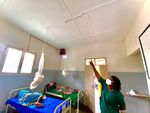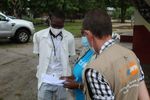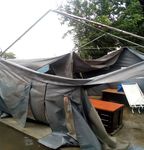CYCLONE PREPAREDNESS AND RESPONSE - UNFPA Mozambique
←
→
Page content transcription
If your browser does not render page correctly, please read the page content below
CYCLONE PREPAREDNESS
AND RESPONSE
JANUARY 2021
Photo: © UN Mozambique/Brenda Hada
UNFPA PRIORITIES
CYCLONE ELOISE IMPACT* Deliver life-saving sexual and
reproductive health (SRH) and gender-
based violence (GBV) interventions for
262,000+ people affected (49,500+ families)
Cyclone-affected women and girls,
16,000 people displaced
including safe deliveries, family planning,
17,000 houses impacted
and adequate care for prevention and
82 health units damaged
response to GBV (reproductive health kits)
400+ classrooms damaged or destroyed
Ensure continuity of essential health
In the early hours of 23 January, Cyclone Eloise –
services for women and girls, including
a category two storm packing winds of up to 120
sexual and reproductive health and
km/hour, gusts of 150 km/h – made landfall in
gender-based violence services (mobile
Sofala Province in central Mozambique, an area
brigades)
still recovering from the devastation of Cyclone
Idai some two years ago.
Establish temporary safe spaces for
women and girls affected by the cyclone
Heavy rains in the lead-up to Cyclone Eloise had
already raised rivers and basins above their alert
Prevent COVID-19 transmission among
levels, increasing the risk for significant flooding
health workers and displaced people, with
in low-lying areas, including Busi district and
a focus on women, girls, and older persons
Beira city.
Preliminary hydrographic analysis suggests that
the Limpopo river may flood as a result of the
cyclone, prompting preparedness efforts in
northern Gaza Province and Limpopo valley.
*as of 26 January, data for Sofala, Manica, Inhambane, and Zambezia Provinces provided Photo: © UNFPA Mozambique
by Mozambique's Institute for Disaster Management and Risk Reduction, INGDCYCLONE PREPAREDNESS
AND RESPONSE
JANUARY 2021
Photo: UNFPA Mozambique
Sofala Province:
Responding to the urgent needs of
women, girls and those most vulnerable
UNFPA pre-positioned supplies ahead of Cyclone Eloise:
Twenty-two (22) tents to serve as temporary health centers
Photo: UNFPA Mozambique
and women-friendly spaces
Reproductive health kits to ensure safe deliveries for a
population of 90,000 over a three-month period Impact of Cyclone Eloise in
2,500 dignity kits with essential items for vulnerable women other provinces
and girls, such as soap, underwear, face masks, reusable
menstruation pads, and more
COVID-19 infection and prevention control supplies Six (6) health facilities damaged in Zambezia
Province
UNFPA also supported the Government of Mozambique by:
Supporting feasibility of assessments and immediate access to Three (3) maternity wards affected in
affected areas by providing two cars to Provincial authorities Chinde, Namacurra, and Luabo Districts in
Leading the GBV sub-cluster at the Provincial level, including Zambezia province, impacting the provision
facilitating and coordinating the implementation of multi- of services
sectoral, inter-agency GBV interventions
Participating in health and protection assessments in Two (2 ) shelter centers in Manica province
provinces to determine areas of support received almost 200 Cyclone-affected
Making technology and IT equipment available to the INGD individiuals
for communication and mapping exercises
“Some people who experienced Cyclone Idai say Eloise was just as bad – not quite as strong, but longer,”
- UNFPA staff member based in Beira, SofalaCYCLONE PREPAREDNESS
AND RESPONSE
JANUARY 2021
Photo: UINFPA Mozambique
TROPICAL STORM CHALANE:
UNFPA Response
Photo: UINFPA Mozambique
- Supported preparedness efforts linked to GBV and sexual and
reproductive health service provision, 350 dignity kits to be
distributed. Situational Overview
Tropical Storm Chalane crossed central
- Assessed damages to health centers, rural hospitals, and Mozambique on December 30, 2020,
resettlement areas through a mission led by the Government and sustaining winds of 90km/h upon making
partners to the most-affected districts of Sofala province. landfall in Sofala Province.
- 2,000 dignity kits sent to Sofala Province, with items including Preliminary Damage Reports
soap, capulanas, menstruation pads, light, and whistle, to support (INGD, 4 Jan)
the health, hygiene, and safety of women and girls.
21 health units
- 15 tents (24sqm in size), including equipment and furniture, 87 schools
provided to support the continuity of sexual and reproductive 25,000+ homes
health services and/or serve as women-friendly spaces.
The infrastructure damage of health
- Equipment shipped and three vehicles made available to the units/hospitals impacts the availability of
National Disasters Management Institute (INGC) and the maternal and sexual and reproductive
Provincial Government (DPS). health services and consultations.
- 100 liters of fuel provided to rural hospitals to power operating Within the province, approximately 90,000
room generators and ensure continuity of life-saving emergency displaced people reside in resettlement
surgical procedures. sites in Mandruzi, Estaquinha, Mutua,
Savene, and MetuchiraCYCLONE PREPAREDNESS
AND RESPONSE
JANUARY 2021
Photo: UN Mozambique
Photo: UN Mozambique
PREPARING FOR NATURAL DISASTERS
Pre-positioning vital supplies and commodities: tents for service
continuity, reproductive health, and safe delivery kits, and Photo: UNFPA Mozambique
personal protective equipment for health workers
Remote-base care: immediate deployment of mobile health Mozambique is the third
brigades to offer integrated health and protection services
Safe spaces: operational to immediately provide survivor-
most vulnerable country in
centered services, including emergency case management, Africa to disaster risks
referrals, and psychosocial support - UN Global Assessment Report on Disaster
GBV risk mitigation: raising awareness of available services and Risk Reduction
information on referral pathways
New technologies: geo-mapping and accessibility mapping to
strengthen assessments and identify areas of support
-----
Community surveillance and early warning: to build resilience
among communities and those most vulnerable A climate crisis is a
humanitarian crisis.
During conflicts, natural disasters
With climate change, natural disasters are likely to become and public health emergencies,
more common and more severe, and as we’ve seen, women and sexual and reproductive health
girls will bear the brunt of these crises. needs are often overlooked – with
staggering consequences.
UNFPA works with the Government and partners to better
respond to future disasters. It is only by working together, Women do not stop giving birth, and
across all sectors and issue areas, that we can ensure we do risks of gender-based violence
not leave behind vulnerable women and girls in times of crisis. increase during conflicts and
disasters.
- Andrea M. Wojnar, UNFPA Mozambique RepresentativeYou can also read


























































